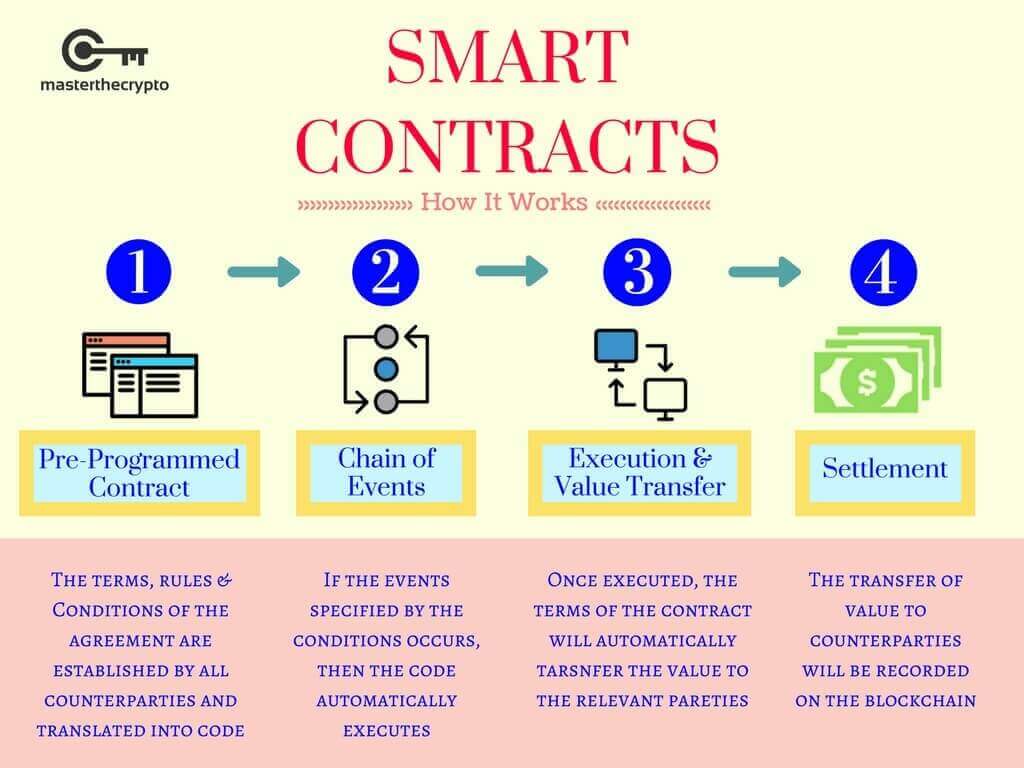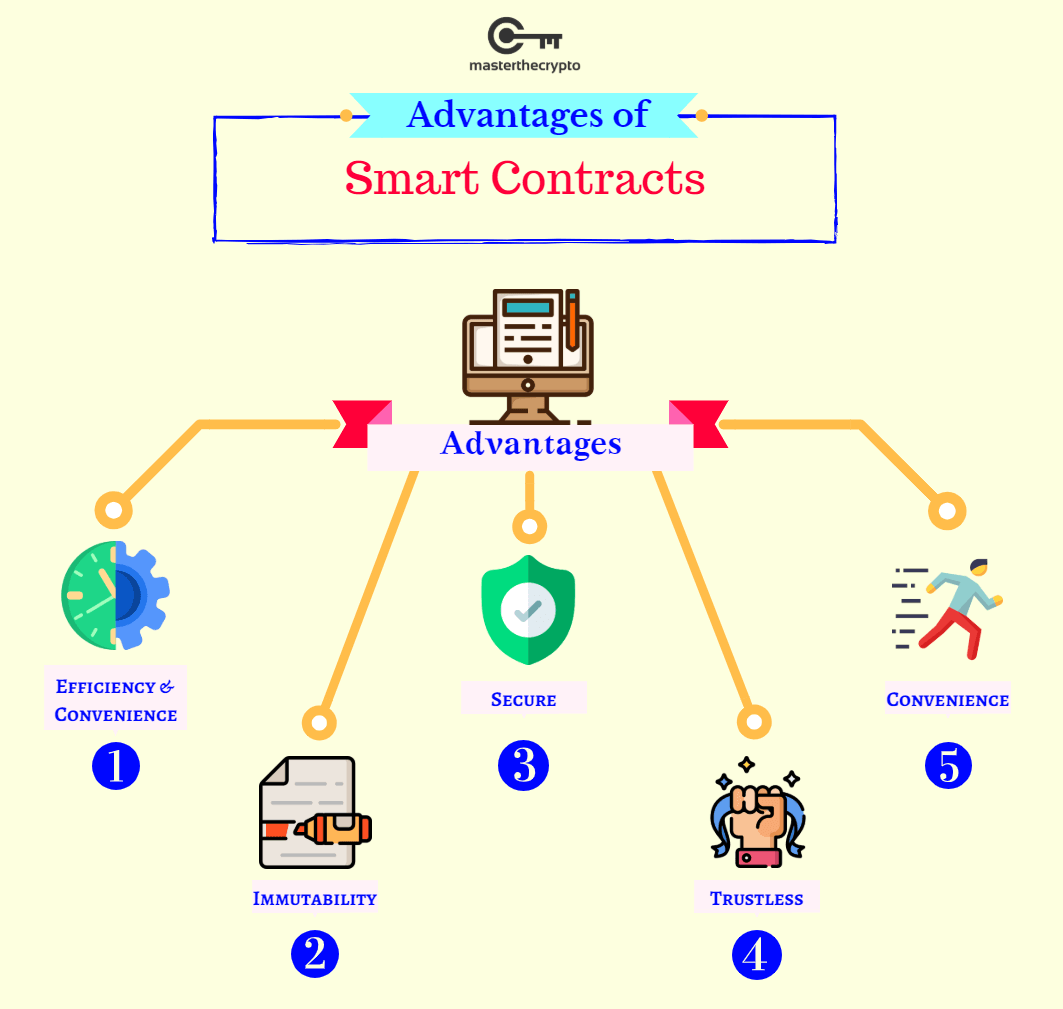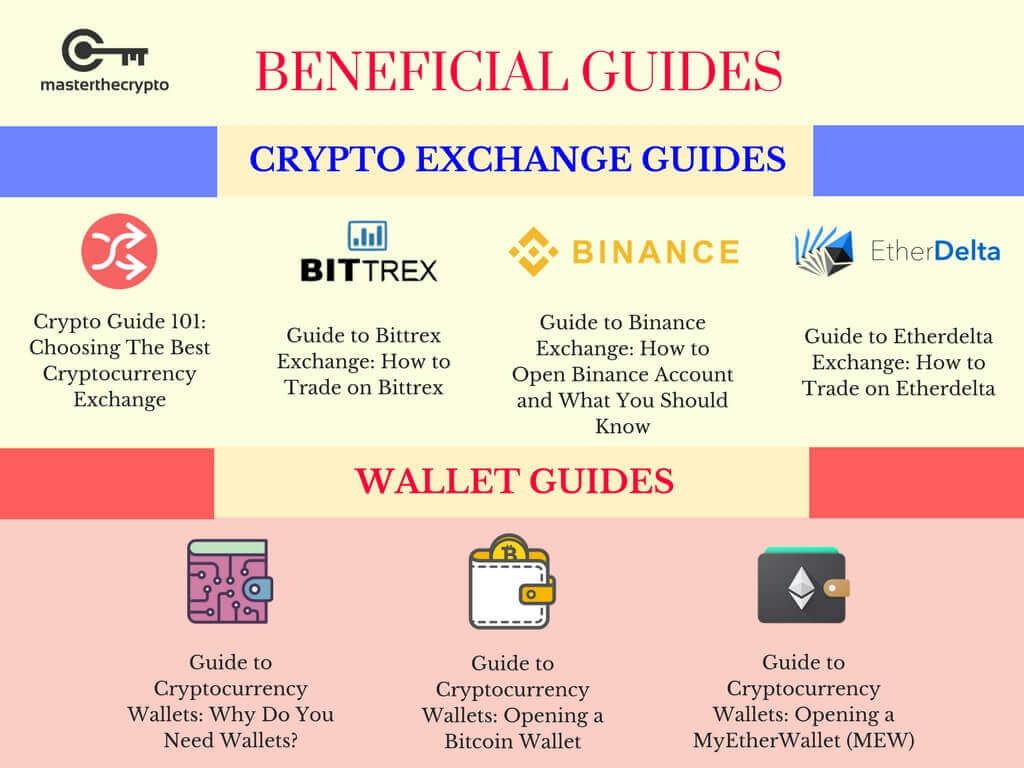Guide to Smart Contract: What are Smart Contracts?

This guide to smart contract takes a look at what are smart contracts and how they work. The various applications and use cases will also be explored.
Blockchain technology is a crowning jewel created from the advancements of cryptography and computer science. It is fast gaining traction as a revolutionary innovation with the potential of disrupting current systems and a wide-range of industries. One of the most exciting evolution of blockchain is the advancements of smart contract technology. This article will be dedicated to uncovering the concept of smart contracts and how the technology works.
(See more: Guide to Blockchain Protocols: Comparison of Major Protocol Coins)
What is A Smart Contract?
Smart contracts are any contracts that have been pre-programmed with a set of definitive rules and regulations that are self-executing, without the need of any intermediaries. Therefore, with any given inputs, there will be a known output.
Smart contracts are the rough equivalent in the blockchain of an Application Programming Interface (API) in a traditional web environment. An Application Programming Interface (API) is a set of functions and procedures that allow users to interact with an application. It allows applications to communicate with each other. API is mostly used to develop different software applications and features.
In order to better understand the concept of APIs, let’s take a look at a simple analogy. Imagine sitting in a restaurant and looking at the menu. After the waiter records the food items that you’ve ordered, he will send that order to the kitchen. Once your food has been cooked, the waiter will deliver your food to your table. In this case, you are the application user, the kitchen is the computing system (that executes all commands and requests) and the waiter is the API. The waiter is the messenger that takes your order (requests) and tells the kitchen (computing system) on what to do. API therefore facilitates the communication between different software components and applications.
The smart contract is what connects the decentralized blockchain database (which in our example replaces a conventional central database) to the front-end application, which on the blockchain is a decentralized application (dAPP). The dApp uses one or more smart contracts, each enabling different functions or transactions, to communicate with the blockchain. For example, in a financial application one smart contract could allow the user of the dApp to send and receive funds, while another smart contract could schedule a payment plan.
Here is a visualization of an application of smart contracts:

These transformative tools are game-changers for those looking to have a more efficient and credible process for contracts of all kinds.
(Read also: Guide to Blockchain Scalability: Bitcoin Scalability Problem and Effects)
Evolution of Smart Contracts
Nick Szabo – a legend in the field of computer science and cryptography – is often regarded as the inventor of smart contracts. He dreamed up the notion of recording contracts in code way back in 1994. His work laid the foundations for smart contract technology; a software program that appends layers of information onto digital transactions via the blockchain. Smart contracts are self-executing contracts that operate on an if-then premise, enabling transactions to complete once the terms of the contract are met. The terms of the contracts are coded directly into the smart contract. We can illustrate using the purchase of a car; if the funds are released via a smart contract, then the digital title of the car is turned over to the buyer, also via smart contract.
Ethereum is one of the earliest and most popular blockchain projects that is built specifically to support smart contract functionality. Since then, there is a wide variety of project that focuses on implementing smart contract technology such as NEO, Lisk, and Waves.
Smart contracts allow for much more complex transactions than just the exchange of digital currency for services or products. They can execute many other functions as well. Imagine a blockchain version of a social media site like Facebook or Instagram. The homepage the user interfaces with could be a blockchain-based dApp, while every interaction—every comment, every like and every post—is driven by multiple smart contracts.
(See more: Evolution of Cryptocurrency: Importance of Retail-Driven Crypto Adoption)
Multiple Contracts Can Be Used in Each DApp
Most decentralized applications will use more than one contract to execute its various tasks. Each smart contract must be deployed independently and will have its own blockchain address, where you can go to interact with it. If different smart contracts need to interact with each other – say for instance contract number one needs to communicate with contract number two – contract number one will need to know the address of contract number two. Both contracts – one and two – are “first-class citizens in the network,” even though one depends upon the other.
There are many applications that utilize smart contracts. In fact, most projects use smart contracts to facilitate their Initial Coin Offerings (ICOs). Investors would send their initial investments – usually in the form of Ether (ETH) – to the ICO smart contract address and would automatically receive the ICO native tokens in proportion to their investment. By using smart contracts, ICOs would eliminate the need for using intermediaries to handle and manage the investments, since smart contracts would automate the entire process. Here is how one can participate in an ICO:

There are also blockchain projects that facilitate smart contract functionalities across a range of industries. For instance, social media mavens can use smart contracts in conjunction with BOOSTO to track client deals, store transactions, and literally any if/then scenario where trust and security are required. And for even more added safety and assistance, projects like blockchain-based Hosho will audit your smart contracts to ensure every element is properly and efficiently executed. If a particular dApp requires multiple contracts, it helps to use additional tools to streamline and simplify the process.
(Read also: Crypto ICO vs. Stock IPO: What’s the Difference?)
Advantage of Smart Contracts
Nick Szabo famously likened smart contracts to vending machines. Just put in your change and in return, you’ll get a can of soda or a candy bar out. No third parties are necessary; if you deposit the change, then the soda comes out. The efficiency that smart contracts afford is obvious advantages. Let’s take a look at the different advantages that smart contracts facilitate:

Efficiency & Cost Reduction: Smart contracts facilitate direct transactions between two or more parties, without any need for intermediaries. The absence of intermediaries will reduce the costs of execution and streamline the entire process.
Immutability: Since all transactions are recorded on the open-source, public blockchain, all information pertaining to the transaction will be immutable and transparent. This means that transactions cannot be altered or removed; it becomes forever a part of the record of the public blockchain database.
Secure: Blockchain technology uses a decentralized and distributed system, which is much more secure than a centralized system. Since all nodes in the network are required to download the entire database of transactions, no single authority has control over the database. This makes it extremely hard for hackers to infiltrate the network.
Trustless: Smart contracts are made up of coded rules. Therefore, “Code is King”. Users do not need to trust the other party or anyone else since the rules of the smart contracts are transparent on the blockchain and there are no intermediaries that facilitate the transactions. Therefore, transactions will be executed in a trustless environment. Blockchain also allows for transparent and easy verification. Imagine the benefits of running a smart contract-enabled crowdfunding campaign. There would be far less danger of donating to fraudulent campaigns with monies going into an account that is distributed across the network, instead of being handled by one person or group of persons.
Convenience: Software code automates tasks, making formerly complex and time-consuming transactions much quicker to complete. Documents can be digitalized and notarized in an instant.
(See more: A Guide To Fundamental Analysis For Cryptocurrencies)
Possible Use Cases for Smart Contracts
As stated earlier, smart contracts can be used for a broad range of use cases, not just financial transactions. A smart contract can execute a financial or contractual agreement between two parties, or it can simply trigger the execution of functions in a blockchain-based application. Here are few industries that smart contracts can be used to facilitate transactions and business operations:
Healthcare Systems: Smart contracts can be used to securely transfer data, allowing patients to actually have control over their own data. Third parties – such as researchers or biomedical institutions- would have no access unless given express permission by the patient. They could also be used for healthcare management tasks like prescription management, testing results, regulation compliance and ordering healthcare supplies.
Government: Smart contracts would provide a secure system for voting, greatly reducing concerns about voter fraud by providing a much more secure and transparent system. Votes protected by the blockchain ledger would have to be decoded and would require a great deal of computing power to access. Also, the ease of voting via smart contract could greatly improve voter turnout.
Management: The blockchain, with its automated systems, facilitates workflows and provides an immutable ledger as a source of trust. The accuracy and transparency of a blockchain-based system cut time spent waiting for approvals and signatures. Smart contracts streamline procedures and eliminate discrepancies that can lead to issues such as settlement delays and lawsuits.
Real Estate: The real estate industry is inefficient and expensive due to its manual nature and that it greatly relies on third-party brokers to facilitate transactions. With smart contracts, participants can save a huge amount of costs related to listing and brokers’ fees. In late 2017, a house was bought using smart contracts and blockchain technology for the first time in Ukraine. There are estimations that smart contracts will be used by more than 25% of global organizations by 2022. The evolution of these technologies is a dynamic process, and as businesses open themselves up to using smart contracts to enhance operations and change the face of traditional employment, more innovative ways of implementing smart contracts will present themselves.
(You might also be interested in: Guide on Identifying Scam Coins)
—–
This article is contributed by Heidi Yu, a serial entrepreneur, influencer marketing evangelist and AI enthusiast. An MBA graduate from Seattle University, she successfully founded Boostinsider at the end of 2014. As one of the few women leaders in blockchain adaptation, Heidi founded BOOSTO.io, an influencer driven decentralized app store that returns power to creators and makers. Heidi speaks to audiences around the world about the adoption and the benefits of the blockchain.
Beneficial Resources To Get You Started
If you’re starting your journey into the complex world of cryptocurrencies, here’s a list of useful resources and guides that will get you on your way:

Trading & Exchange
- Crypto Guide 101: Choosing The Best Cryptocurrency Exchange
- Guide to Bittrex Exchange: How to Trade on Bittrex
- Guide to Binance Exchange: How to Open Binance Account and What You Should Know
- Guide to Etherdelta Exchange: How to Trade on Etherdelta
- Guide To Cryptocurrency Trading Basics: Introduction to Crypto Technical Analysis
- Cryptocurrency Trading: Understanding Cryptocurrency Trading Pairs & How it Works
- Crypto Trading Guide: 4 Common Pitfalls Every Crypto Trader Will Experience
Wallets
- Guide to Cryptocurrency Wallets: Why Do You Need Wallets?
- Guide to Cryptocurrency Wallets: Opening a Bitcoin Wallet
- Guide to Cryptocurrency Wallets: Opening a MyEtherWallet (MEW)
Read also: Crypto Trading Guide: 4 Common Pitfalls Every Crypto Trader Will Experience and Guide To Cryptocurrency Trading Basics: Introduction to Crypto Technical Analysis.
Get our exclusive e-book which will guide you on the step-by-step process to get started with making money via Cryptocurrency investments!
You can also join our Facebook group at Master The Crypto: Advanced Cryptocurrency Knowledge to ask any questions regarding cryptos!
I’m Aziz, a seasoned cryptocurrency trader who’s really passionate about 2 things; #1) the awesome-revolutionary blockchain technology underlying crypto and #2) helping make bitcoin great ‘again‘!
The post Guide to Smart Contract: What are Smart Contracts? appeared first on Master The Crypto.



